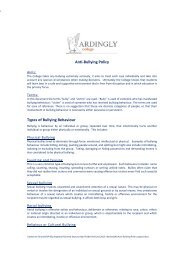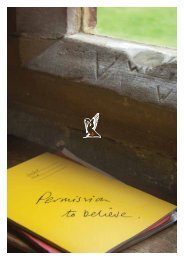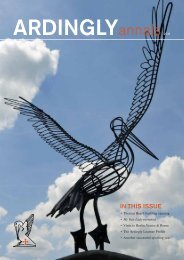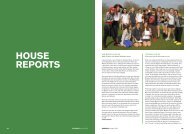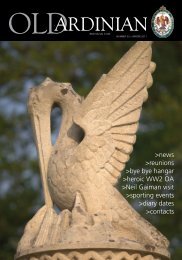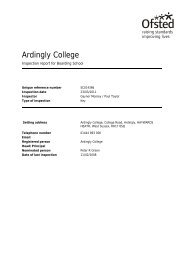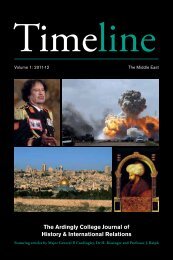Child Protection - Ardingly College
Child Protection - Ardingly College
Child Protection - Ardingly College
Create successful ePaper yourself
Turn your PDF publications into a flip-book with our unique Google optimized e-Paper software.
<strong>Child</strong> <strong>Protection</strong> – Safeguarding and Welfare<br />
of Pupils Policy<br />
<strong>Child</strong> <strong>Protection</strong> Policy Statement<br />
‘We at <strong>Ardingly</strong> <strong>College</strong> are committed to a practice which protects children<br />
from harm. Staff at the school accept and recognise their responsibilities to<br />
develop awareness of issues which cause harm to children’.<br />
“An abused child is a boy or girl under the age of 18 years who has suffered<br />
from, or is believed to be at significant risk of physical injury, neglect,<br />
emotional abuse or sexual abuse” (Sussex <strong>Child</strong> <strong>Protection</strong> and Safeguarding<br />
Procedures, 2006)<br />
The school aims are:<br />
To adopt child protection guidelines through procedures and a code of<br />
conduct in accordance with The <strong>Child</strong>ren Act 1989, Human Rights Act 1998,<br />
The United Nations Convention on the Rights of the <strong>Child</strong>, Every <strong>Child</strong><br />
Matters and Ofsted guidelines.<br />
To ensure that staff are able to identify children at risk.<br />
To ensure that children considered to be at risk receive the necessary care<br />
and support they need.<br />
To work with individual practitioners and agencies concerned with child<br />
protection.<br />
To establish an ethos of mutual support amongst all staff, so that any<br />
questions and concerns may be shared.<br />
To observe safeguards for the selection and appointment of staff in<br />
accordance with <strong>Protection</strong> of <strong>Child</strong>ren Act 1999 and The Police Act 1997.<br />
To ensure that all members of staff are provided with opportunities to receive<br />
training by the Deputy Headmaster/ Head of PrePrep in order to develop their<br />
understanding of the signs and indicators of abuse every three years.<br />
To ensure that all members of staff, volunteers and governors know how to<br />
respond to a pupil who discloses abuse, and the procedure to be followed in<br />
appropriately sharing a concern of possible abuse or a disclosure of abuse.<br />
To ensure that all parents/guardians are made aware of the school’s<br />
responsibilities in regard to child protection procedures through publication of<br />
the school’s <strong>Child</strong> <strong>Protection</strong> Policy, and reference to it in our<br />
prospectus/brochure and home school agreement.<br />
To ensure that all adults, including supply teachers, non-teaching staff and<br />
volunteers new to our school will be given a written statement about the<br />
school’s policy and procedures and the name and contact details of the<br />
Designated Person and have these explained as part of the induction into the<br />
school.
<strong>Child</strong>ren and young people often tell other young people, rather than staff or<br />
other adults, about abuse: make sure that your senior students know the main<br />
points on dealing with allegations of abuse.<br />
To review our policy and good practice at regular intervals.<br />
To display information about how children can get support and guidance in<br />
prominent places around the <strong>College</strong>.<br />
The four main recognised forms of abuse are:<br />
(i)<br />
(ii)<br />
(iii)<br />
(iv)<br />
Physical abuse – caused through a deliberate act or through<br />
omission or failure to act to protect;<br />
Emotional abuse – treatment which causes severe or persistent<br />
adverse effect on emotional development. Some level of<br />
emotional abuse is involved in all types of ill treatment of a child,<br />
though it may occur alone;<br />
Sexual abuse – taking part in sexual activities or involving children<br />
to behave in sexually inappropriate ways;<br />
Neglect – leading to serious impairment of the child’s health or<br />
development.<br />
Recognising Abuse<br />
Recognising abuse is not easy and it is not our responsibility to decide whether or not<br />
child abuse has taken place or if a child is at significant risk. We do, however, have a<br />
responsibility to act if we are concerned.<br />
Possible outward signs of abuse may include one or more of the following:<br />
Unexplained physical injury or an injury that is inconsistent with the<br />
explanation;<br />
Sudden changes in behaviour/demeanour and/or deterioration of academic<br />
performance;<br />
Anxiety and/or low self-esteem;<br />
Knowledge of sexual matters beyond what would normally be expected.<br />
The above are only possible indicators of abuse and not in themselves proof that<br />
abuse has occurred.<br />
If any member of staff suspects that any student may be at risk from whatever cause<br />
(including from another student) - he/she should contact the Prep School Deputy<br />
Headmaster (DHM) or Head of PrePrep immediately. The DHM and Head of<br />
PrePrep are the ‘Designated Teacher’ (formerly known as the <strong>Child</strong> <strong>Protection</strong><br />
Officer) for their site. The Designated Teacher will then inform the Headmaster and<br />
follow the procedures outlined in the ‘Sussex <strong>Child</strong> <strong>Protection</strong> and Safeguarding<br />
Procedures’ (2006) a copy of which is available for any member of staff to read and<br />
consult. There are also copies in the Common Room and the Medical Centre. This<br />
may result in the police, parents and Social Services becoming involved.<br />
In the event of allegations or suspicions of abuse, a referral must be made within 24<br />
hours (in writing or with written confirmation of a telephoned referral) of allegations or<br />
suspicions of abuse to the local social services department to carry out child<br />
protection investigations, rather than internal investigation by the school.
If a child discloses abuse to a member of staff, the member of staff should:<br />
Always stop and listen straightaway to someone who want to tell you about<br />
incidents or suspicions of abuse;<br />
Limit any questioning to the minimum necessary to seek clarification only,<br />
strictly avoiding ‘leading’ the pupil or adult who has approached them by<br />
making suggestions or asking questions that introduce your own ideas about<br />
what may have happened. (Do not ask questions like ‘Did he do x to you’,<br />
using instead a minimum number of questions of the ‘Tell me what has<br />
happened’ type);<br />
School prefects are instructed on the appropriate action to take should they<br />
receive any allegations of abuse as part of their induction. They are briefed<br />
and asked to read this document;<br />
Allow the child to continue at his or her own pace. Do not rush them;<br />
Never make a promise that you will keep what is said confidential or secret. If<br />
you are told about abuse, you have a responsibility to report it, so that action<br />
can be taken. Give reassurance that only those who need to know will be told<br />
Stop asking any more questions as soon as the pupil or adult has disclosed<br />
that he or she believes that something abusive has happened to him or her,<br />
or to someone else;<br />
Tell the informing pupil or adult that the staff member will now make sure that<br />
the appropriate people are brought in to follow the problem up (these will<br />
include a specialist social worker, and that worker may need to involve the<br />
police);<br />
Ask the informing pupil or adult what steps they would like taken to protect<br />
them now that they have made an allegation, and assure them that the school<br />
will try to follow their wishes;<br />
Reassure all concerned that they have done the right thing by reporting their<br />
concerns;<br />
Refer the matter the same day, with all relevant details, to the Designated<br />
Teacher;<br />
Make a handwritten record (including time, place and the people present<br />
when the child disclosed) as soon as possible of what they have been told<br />
and make a copy of this available to the Designated Teacher .<br />
It is important that the child concerned does not have to repeat the disclosure to<br />
more people than necessary. Where possible the staff member to whom the<br />
disclosure was made should remain with the child to offer support pending advice<br />
from the Police/Social Services of the investigative process. No further questioning of<br />
the child or any further enquiries should be attempted. Staff should not interview the<br />
alleged perpetrator or take any action that may alert them.<br />
If any member of staff or volunteer or any person on the school’s payroll is suspected<br />
then the Headmaster must be contacted in the first instance; this procedure also<br />
includes the Designated Teacher.<br />
If it is felt that the Headmaster is suspected then contact must be made direct with<br />
the Chairman of the School Council, through the Clerk to the Governors, Paddy<br />
Jackman.<br />
If a member of staff who is resident in boarding accommodation is suspected,<br />
arrangements may be made for alternative accommodation pending the<br />
investigation.
The school will report to the Independent Safeguarding Authority (ISA) within one<br />
month of leaving the school any person (whether employed, contracted, a volunteer<br />
or student) whose services are no longer used because he or she is considered<br />
unable to work with children. The ISA’s address for referrals is PO Box 181,<br />
Darlington DL1 9FA (tel: 0300 1231111).<br />
The Designated Teachers are fully trained in inter-agency working and child<br />
protection. This training should be undertaken at two yearly intervals. Similarly<br />
members of staff including the Headmaster should receive <strong>Child</strong> <strong>Protection</strong> Training<br />
every three years. Mr J Sloane is currently the member of the Governing Council<br />
who has responsibility for <strong>Child</strong> <strong>Protection</strong> and the Council reviews <strong>College</strong> <strong>Child</strong><br />
<strong>Protection</strong> policies and procedures annually.<br />
Part-time staff, volunteers and other persons on the school’s payroll are briefed both<br />
on the contents of this document and the essential content delivered to staff as part<br />
of their <strong>Child</strong> <strong>Protection</strong> Training.<br />
All staff and volunteers will follow the <strong>College</strong> procedures in conjunction with the<br />
following policies:<br />
Equal Opportunities Policy – all children regardless of ethnicity, class, age,<br />
sexual orientation, gender, religion or disability have equal rights to protection<br />
from harm and may be vulnerable to abuse;<br />
Complaints and Grievance Policy – commitment to providing high quality, fair<br />
and safe services;<br />
Staff Disciplinary Policy and Procedure – guidelines and codes of conduct<br />
describe appropriate and acceptable behaviour and what may happen if these<br />
guidelines are not followed;<br />
Health and Safety Policy;<br />
Anti-Bullying Policy;<br />
Missing Students Policy;<br />
Whistleblowing Policy (note that there is immunity from ‘whistle blowing’ in<br />
good faith);<br />
Restraints Policy (note that this makes clear that corporal punishment is not<br />
permitted at the school and is against the law)<br />
If Social Services need to be contacted their telephone number is: 01243 771000.<br />
Concerns may also be addressed to ISI (Tel No: 0207 600 0100).<br />
Never think abuse is impossible in your school or that an accusation against<br />
someone you know well and trust is bound to be wrong.<br />
Responsibility: Jim Castle<br />
Reviewed: September 2013<br />
Next Review: September 2014<br />
Checked by Governor:<br />
Date:



